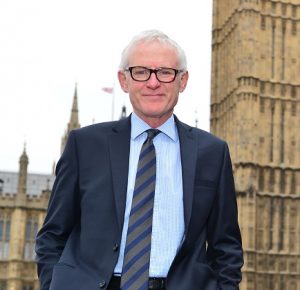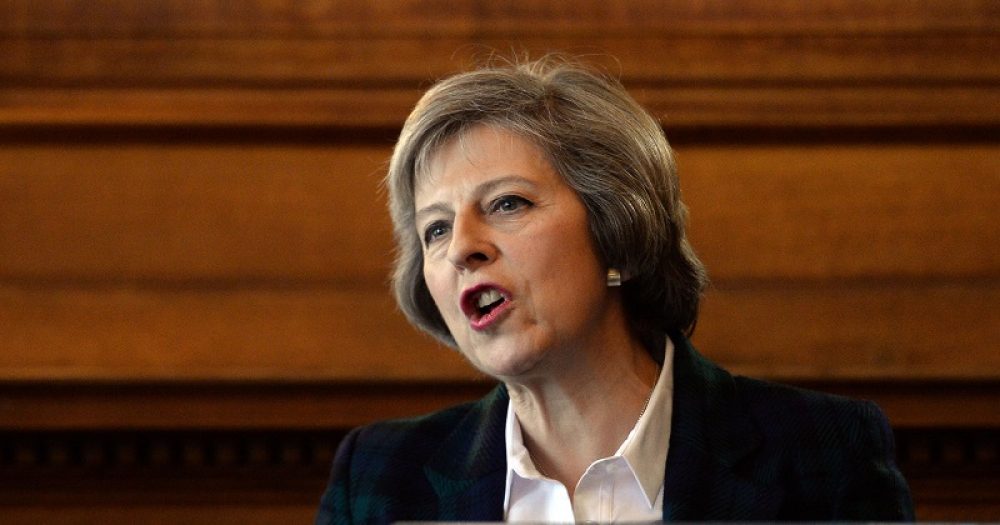Every secondary school in England will get free mental health training and improved support from local health services, the prime minister has announced today.
In a speech at the Charity Commission this morning, Theresa May said a new approach to tackling mental health problems would start with ensuring that children and young people “get the help and support they need and deserve”.
The government says mental health training will be delivered by Mental Health First Aid UK to staff in a third of secondary schools this year.
This starts with ensuring that children and young people get the help and support they need and deserve
The remaining two-thirds of secondary schools will be offered this training in the following two years.
It is hoped that the additional training will make school staff better at spotting signs of mental health problems in pupils.
May said a plan to transform mental health services should start “not in our hospitals, but in our classrooms, at work and in our communities”.
“This starts with ensuring that children and young people get the help and support they need and deserve – because we know that mental illness too often starts in childhood and that when left untreated, can blight lives, and become entrenched.”
Writing in The Times today, the education secretary Justine Greening said the government also wanted to see schools get “the best support” from their local mental health services, “so children needing help can get the right treatment as quickly as possible”.
“This will be backed up by our health and education watchdogs, the Care Quality Commission and Ofsted,” she said.
It will include new trials to strengthen links between schools and local NHS mental health staff.

Ministers have also pledged a review of child and adolescent mental health services across the country, which will take place in the spring and inform a new strategy due to launch later this year.
It follows calls from the former health minister Norman Lamb for a mental health lead in every school.
The Education Policy Institute’s independent commission on children and young people’s mental health, led by Lamb, last year also demanded evidence-based training for teachers and for schools to be inspected on pupil well-being.
In its report Time to deliver, the commission called for a ‘prime minister’s challenge on children’s mental health’, to also include statutory PSHE.
It also comes after a report by the Prince’s Trust found that 37 per cent of young people feel stressed about how to cope at work or school.
Russell Hobby, the general secretary of the National Association of Head Teachers, has welcomed the focus on children’s mental wellbeing, but said it would “fall short” without proper funding, especially in the face of cuts to school budgets.
“Just as we are becoming more aware of children’s mental health issues the resources are being taken away.
“School budgets are being cut by £3 billion so it will become increasingly difficult to fund in-school care for children unless these cuts are reversed immediately.”
Joint research by the NAHT and mental health charity Place2Be reveals seven out of ten school leaders found funding was the “chief barrier to putting in place professional mental health support for pupils”.
Six in ten said the “lack of services or qualified professionals locally” was a “significant barrier”.








Where an earth does one begin? On a positive it is encouraging to hear the PM give regard to the issue of child mental health. She then reportedly talks about young people getting “the help and support and they need and deserve.” This comment would perhaps have a little more credence if it.did not come from a former minister who sat in a cabinet over 6 years that has governed whilst CAMHS provisions have reduced capacity and raised thresholds.
We then come to the crux of the “initiative” which is to exhort teachers to become the front line in meeting mental health needs. It may have passed the PM by but in many instances teachers are by default already fiulfilling that role. The suggestion of additional training is of course welcome. The idea of a lead teacher for mental health seems not a bad one. All too often though teachers find themselves being the equivalent of a mental health elastoplast trying to cover a gaping mental health wound. In the most severe cases these youngsters do not need a person supporting their mental health needs in addition to their already demanding role – they need a mental health specialist who has trained and specialised in that role.
I am tired of seeing teachers asked to do more for less – funding that is, reportedly, the equivalent of £23,000 per constituency will barely cover the reduction in services over the last six years, The recent SEND code of practice demonstrates all we need to know. Strong on rhetoric but never the provision of enough funding to transform the rhetoric into a reality. We also all know the next line in this story – funding that does not match demand and an Inspectorate charged with turning the “thumbscrews”, sorry “monitoring”, so as to ensure school’s work ever harder to meet underfunded ministerial demands on an issue.
One of the best ways of supporting the mental well-being of young people would be to address the pressing recruitment and retention crisis in teaching, Supportive teacher-pupil relationships can go a long way to supporting pupils mental well-being. Sadly too many of our young people are taught by the fraught who are themselves downtrodden by constant changes in staff due to recruitment and retention challenges and emotionally scarred by a draconian accountability system alongside initiative overload. If we societally do not value the emotional well-being of our teachers it is frankly a little bit rich to expect them to be in an emotionally good place to support the mental health needs of the nation’s young people.
Has the PMs announcement made me angry? Too right. As John Major once said “fine words butter no pasrsnips.”
I completely agree and what about the new exam regime which disenfranchises swathes of our students? The impact of this on mental health and stress levels is all too visible already.
Where an earth does one begin? On a positive it is encouraging to hear the PM give regard to the issue of child mental health. She then reportedly talks about young people getting “the help and support and they need and deserve.” This comment would perhaps have a little more credence if it.did not come from a former minister who sat in a cabinet over 6 years that has governed whilst CAMHS provisions have reduced capacity and raised thresholds.
We then come to the crux of the “initiative” which is to exhort teachers to become the front line in meeting mental health needs. It may have passed the PM by but in many instances teachers are by default already fiulfilling that role. The suggestion of additional training is of course welcome. The idea of a lead teacher for mental health seems not a bad one. All too often though teachers find themselves being the equivalent of a mental health elastoplast trying to cover a gaping mental health wound. In the most severe cases these youngsters do not need a person supporting their mental health needs in addition to their already demanding role – they need a mental health specialist who has trained and specialised in that role.
I am tired of seeing teachers asked to do more for less – funding that is, reportedly, the equivalent of £23,000 per constituency will barely cover the reduction in services over the last six years, The recent SEND code of practice demonstrates all we need to know. Strong on rhetoric but never the provision of enough funding to transform the rhetoric into a reality. We also all know the next line in this story – funding that does not match demand and an Inspectorate charged with turning the “thumbscrews”, sorry “monitoring”, so as to ensure school’s work ever harder to meet underfunded ministerial demands on an issue.
One of the best ways of supporting the mental well-being of young people would be to address the pressing recruitment and retention crisis in teaching, Supportive teacher-pupil relationships can go a long way to supporting pupils mental well-being. Sadly too many of our young people are taught by the fraught who are themselves downtrodden by constant changes in staff due to recruitment and retention challenges and emotionally scarred by a draconian accountability system alongside initiative overload. If we societally do not value the emotional well-being of our teachers it is frankly a little bit rich to expect them to be in an emotionally good place to support the mental health needs of the nation’s young people.
Has the PMs announcement made me angry? Too right. As John Major once said “fine words butter no pasrsnips.”
I agree with Pete. Recognition of the importance of mental health support for children and young people is long overdue. However, further overburdening teaching staff without ensuring that specialist services are available is futile. It’s a bit like providing vaccination services but refusing to actually to treat the disease once diagnosed.
What is needed is an assurance that those presenting to GPs needing access to treatment and support are able to access high quality local services rapidly. Anything else is an abdication of society’s responsibility to our young people.
The quickest and cheapest way to improve the mental health of our children and their educators would be to tackle the excessive bureaucracy that is the bane of teachers’ lives and which continues to crucify them. In this Brexit era, it is worth pointing out that this obsession with ticking boxes has nothing to do with the EU and everything to do with our own home grown brand of incessant bureaucratic meddling. This is a peculiarly British disease and although the joyless technocrats that foist it upon us claim that it boosts productivity or benefits the economy, it is having precisely the opposite effect as great teachers continue to flock abroad, turn to supply teaching or tutoring or leave teaching entirely.
Nor is this English disease confined to teaching – the same is true of the medical and care professions and other areas of public service. As one is forced to wait for weeks for a routine appointment with one’s harried GP, it perhaps worth remembering that he or she has some three hours of paper work to complete once the surgery closes. Ah the demands of the new god that is Big Data!…I wonder just how many billions it is costing the economy in lost productivity.
So, the message to our policy makers and managers would be to dare to lead more and manage less and know when to do nothing. Focus less on being clever and more on being wise. Listen to those who are delivering this country’s services. Provide training where it needed and trust people to do their jobs. Let teachers teach, police men and women police, carers care and doctors doctor and stop trying to measure what cannot be measured. Fewer shiny, new initiatives and more actual leadership please and remember that Brexit should apply just as much to our own bureaucracy as to anything coming out of the European Union.